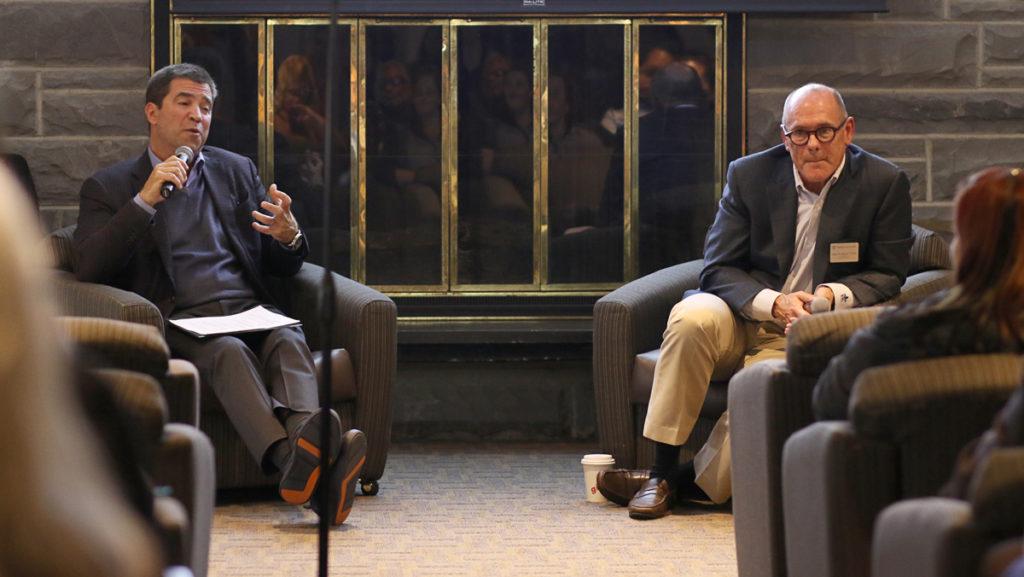The Ithaca College Board of Trustees visited the college for its Fall 2019 meeting from Oct. 23 to Oct. 25. At the end of the week, the board discussed tuition and the implementation of the college’s strategic plan with the campus community.
David Lissy ’87, chair of the Board of Trustees, and Jim Nolan ’77, vice chair of the Board of Trustees, led a conversation with approximately 50 faculty and staff. The discussion focused on the college’s donor base and the strategic plan, Ithaca Forever, which launched Oct. 23. Two students were in attendance at the event.
Before turning to the audience for questions, Lissy said that like other higher–education institutions around the country and in the region, the college is struggling to sustain itself financially. This is due to changing demographics, like the decreasing number of high school graduates in the Northeast.
“Our highest calling as a board is to really help us as Ithaca College navigate what are incredibly choppy waters in the world of higher education,” Lissy said. “We don’t have demographics in our geography on our side. We don’t have a lot of arrows pointing in the right direction. All that said, I’ve never been more confident in the idea that Ithaca will be forever.”
Maura Donovan, associate director of regional programs, said she wanted to know the first goal of the strategic plan the board would like to see addressed. Lissy said the board is mainly responsible for feedback and guidance on the strategic plan.
Lissy said he wanted the college to be affordable and accessible to as many students as possible. Tuition for the 2019–20 academic year was set at $45,275. This was a 2.95% increase from the 2018–19 academic year. Nolan said he would like to see the college become more appealing to students by evaluating the college’s programs.
“Our consumer base, who we attract, it is in fact changing,” Nolan said. “So we’ve got to try to anticipate some of the areas that they’re interested in and start to move our programming to attract that changing consumer base without losing the identity of who we are.”
Denise Fullerton, information systems specialist for the Office of Residential Life, asked how the college plans to build a better community of donors.
Lissy said the board does not feel satisfied with the percentage of alumni who donate to the college. Dave Maley, director of public relations, said in an email that the alumni giving participation rate for the 2019 fiscal year was 6.4%. In 2017, when the college exceeded a $300 million endowment for the first time, it still had the fourth–smallest endowment out of its peer group of 20 colleges, as previously reported by The Ithacan. The peer group is defined by the college as the institutions that have the highest number of applicants in common with Ithaca College. The endowments of the college’s peer institutions ranged from New York University with $4.1 billion to SUNY Albany with $65.3 million.
“We are going to have to make an incredible effort to re-engage not only our alumni base but foundations and friends and parents and other constituency groups and hopefully get them to buy into the vision that we have and the needs that we have to make Ithaca thrive,” Lissy said. “I am not going to sit here making promises or tell you it’s going to be easy. I am going to tell you we’re going to put in a heck of an effort for it, though, and that you have a board that’s extremely committed to it and will get even more committed to it over time.”
Lissy said the board had discussed the possibility of soliciting donations from the crowd Nov. 16 at Cortaca at MetLife Stadium — which is estimated to have approximately 40,000 people in attendance.
Sam Stafford, assistant director for the Office of Residential Life, said she was hearing the board talk primarily about faculty during its discussions, but a large part of the audience was staff members. She said she would like to know the best way to work with all the changes that have been occurring at Ithaca College in recent years as a staff member.
In 2018, the Office of Student Engagement and Multicultural Affairs split into the Office for Student Engagement; the Center for Inclusion, Diversity, Equity and Social Change; and New Student and Transition Programs. College President Shirley M. Collado has created nine new administrative positions, including a new director of religious and spiritual life, during her tenure at the college.
“There’s been a lot of change we’ve seen in a couple of years, and I think sometimes we feel a little fatigue in that,” Stafford said.
Lissy said that although the changes can be overwhelming, they ultimately benefit the college.
“To me, it’s really about first and foremost believing in the vision,” Lissy said. “And believing that the destination of where we’re going is really important to get there.”
Stafford said after the meeting that she is excited about the change and the opportunity to create cocurricular learning environments. However, she said a lot of the institutional change has been hard on staff members.
“I just wanted to know their opinions and how do you keep us motivated, … especially when we’re changing,” Stafford said. The board will meet again from Feb. 12 to Feb. 13 in Los Angeles.
Correction: A previous version of the story said “Maura Donovan, associate director of regional programs, said she wanted to know what goals the board would have had for the college if it had an input on the strategic plan. Lissy said the board is mainly responsible for feedback and guidance on the strategic plan.” The story has been corrected.








